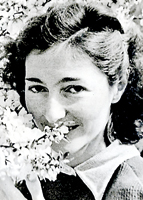Sunday Times 2
The spy who loved men
The beautiful young woman looked coolly around her as the steam train she was travelling on rattled through wartime Poland and armed guards moved from carriage to carriage, carrying out spot-checks on passengers.
No one observing her calm demeanour would have guessed the incriminating contents of the parcel beside her. Full of British propaganda leaflets designed to bolster the Polish spirit of resistance, its discovery would guarantee her execution by firing squad.
Others might have panicked but not Christine Granville, the former Polish beauty queen who became the first British female agent to work in the field, two years before the Special Operations Executive (SOE) began recruiting women for operational duties.
Said to have been Winston Churchill’s favourite spy, she carried a seven-inch commando knife in a leather sheath strapped to her thigh. But her most devastating weapon was an ability to charm men, compared by one admirer to ‘a searchlight which could blind anyone in its beam’. She was about to put it to good use. Smiling flirtatiously at the uniformed Gestapo officer sitting opposite her, she pointed to the problematic package and ‘confessed’ that it contained black-market tea which she was taking to her sick mother in Warsaw.
If the guards discovered it, she would be in terrible trouble so, she pleaded, might he take pity upon her and place it in his suitcase until the danger had passed?

Christine Granville
Like many men before and after him, the unwitting Nazi found Christine impossible to resist. A few hours later, they parted company at Warsaw station, the ‘tea’ safely back in the hands of the woman who, as a fascinating new biography reveals, had an almost pathological need for excitement.
Her real name was Krystyna Skarbek and she was born in Poland in 1908. The daughter of an impoverished Roman Catholic aristocrat and his Jewish wife, she was expelled from convent school at the age of 14 for setting light to a priest’s cassock as he conducted mass.
Later, bewitching many men with what one admirer described as her ‘brilliant, brown, arresting eyes’, and another as ‘her crackling vitality’, she spent much time as a young woman in the fashionable ski resort of Zakopane.
By the time the Germans invaded Poland on September 1, 1939, she was married to Jerzy Gizycki, a wealthy diplomat 20 years her senior who was Polish consul to East Africa.
On hearing about the German invasion, they headed from Africa to London. From there Jerzy continued on to France, where the Polish government-in-exile would soon be established, while Christine, consumed with a reckless spirit of adventure, approached the British secret services with an extraordinary plan.
She proposed travelling to Hungary, which was then still neutral, and from there skiing into occupied Poland. With her she would take the propaganda materials that would later see her seeking the help of that Gestapo officer on the train. She would also gather intelligence from the Polish resistance along the way and feed it back to London.
When Christine arrived in Poland in February 1940, not only was there a war on but it was the worst winter in living memory. None of this discouraged Christine, who not only managed to get her parcel to Warsaw but even found time to begin an affair with Count Wladimir Ledochowski, a member of the Polish resistance and her guide on the return journey.
Their passion was born out of the danger in which they found themselves. She later recalled his fingers unconsciously drumming coded messages on her naked body as he slept.
The insatiable Christine also began a more serious relationship in Hungary with the dashing Andrzej Kowerski, a former Polish army lieutenant.

French actress Eva Green
Together they crossed and re-crossed the Polish borders, bringing in more anti-German propaganda, along with money and explosives, and helping large numbers of Polish officers, many of them pilots, to escape. In all this, she was driven by a hatred for the Nazis which intensified when, in November 1940, she discovered her mother Stefania, by then separated from her father, had been arrested in Warsaw for failing to register as a Jew.
Christine found a Gestapo official who would spare her mother’s life at a price – $300, the equivalent of £3,000 today, and a night in her bed. Only after both payments were taken did he tell her that Stefania had already been sent to Auschwitz death camp, where she perished. Christine was now more determined than ever to help bring down Hitler’s regime. But in January 1941 she and Andrzej were arrested by the Hungarian police, acting on behalf of the Gestapo.
She continued to hold similar sway over the opposite sex. Her marriage to Jerzy had ended in acrimony when he discovered she was seeing other men. Andrzej went to work for the SOE in the Italian town of Bari.
He adored Christine but knew she could never be faithful to one man and, true to form, her time in France soon saw her involved with yet another undercover agent.
At 28, Francis Cammaerts, one of the SOE’s best agents, had a wife and young children back home in England. He was also eight years Christine’s junior but, during a German bombing raid one night, they became lovers.
‘We were all absolutely certain that we were going to die,’ he recalled, and clearly they considered each other’s arms a comforting last sanctuary.
In the end it was not the Germans who brought about her end, rather the unlikely figure of a British cruise-ship steward named Dennis Muldowney.
They met after the war, a very difficult time for Christine. A few months after the armistice she was dismissed from service with a month’s salary and left in Cairo to fend for herself. Christine, unable to settle back into humdrum life, found a job as a stewardess aboard a London to New Zealand passenger liner. As part of their uniforms, staff were required to wear any decorations earned during the war. Christine’s impressive line of ribbons included the George Cross, the French Croix de Guerre and an OBE. Enough to flatter a general, they made her very popular among the passengers, and soon caused viperous whispering about her among the staff. Her only ally was Muldowney, a spivvy type from Wigan who had an eye for the ladies. They began a relationship that he was eager to continue on land, but which soon began to bore Christine. When she ended their affair, he took to stalking her, often turning up unexpectedly at the hotel in West London which was her home in her last years, and refusing to leave her alone.
On June 15, 1952, Christine returned to the hotel after supper with friends, unaware Muldowney was waiting outside with a knife. He followed her into the lobby, demanding that she return his love letters. When she told him she had burned them, he thrust the knife deep into her heart in a single, powerful movement. She was dead from shock and haemorrhage within seconds.
Muldowney made no attempt to escape. He later confessed to the crime and was hanged at Pentonville Prison. The following year, Ian Fleming published his first James Bond novel, Casino Royale. It features as 007′s love interest a dark-haired and enigmatic European beauty named Vesper Lynd. Fleming’s biographer Donald McCormick, claims that this character was inspired by Fleming’s memories of Christine, following a lunch with her in Soho shortly after the war.
© Daily Mail, London
Follow @timesonlinelk
comments powered by Disqus






















